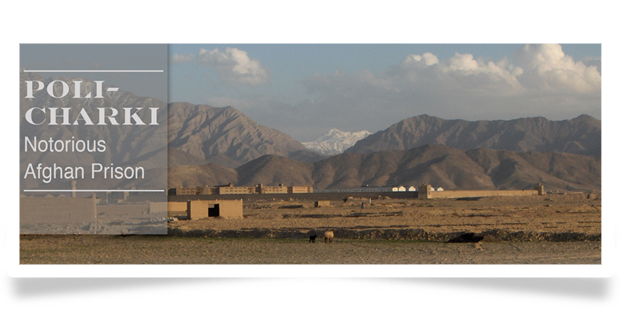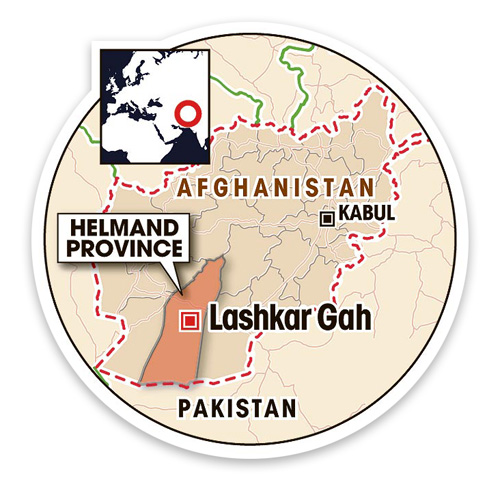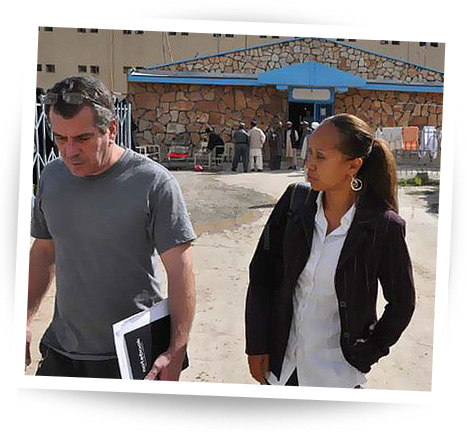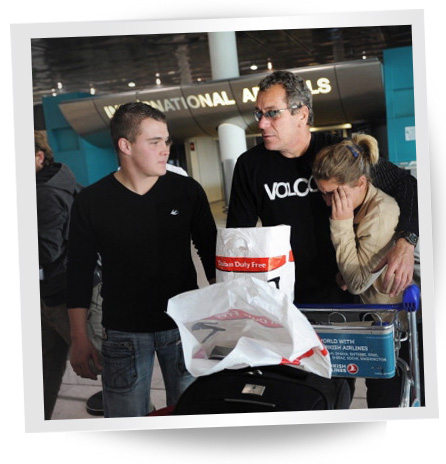My name is Philip Young and I am a South African citizen incarcerated in Afghanistan. My incarceration is the result of an incident that took place in Helmand Province on the 1st of October 2009.
The incident involved the fatal shooting, by me, of an Afghan citizen. The shooting came about when the deceased, Abdul Ghafar, took over, by force of arms and with the collaboration of 5 other guards, the Counter Narcotics base in Lashkar Gar. Abdul Ghafar was the Deputy Site Security Leader and had been fired – but was not immediately removed from the base. When I and the other expats, including the Site Security Leader, returned from a meeting at the local PRT, he confronted me and fired his weapon at me. I returned fire and he was fatally wounded.
There were 2 witnesses to the shooting, an expat and an Afghan citizen. There were approximately 30 people on the base who were intimidated by Ghafar, guards were disarmed and the civilian staff – including employees of the Ministry of Counter Narcotics – were forced into offices and accommodation buildings and kept there, against their will at gunpoint.
Subsequent to the shooting, the Police “investigated” the incident. During the course of this“investigation” vital evidence was moved and disappeared, witnesses were interviewed but any reference to my act as an act of self defense was ignored, statements were NOT taken from witnesses and those who were terrorized and threatened. In short, the Police “investigation” was not an investigation at all. The Police decided that I was guilty of a “crime”, ignored the evidence and witness testimony at the scene and arrested me. Although over 30 witnesses to the actions of Ghafar and the 2 witnesses to the shooting were present, the Police only obtained a single statement – from one of the conspirators. The 5 conspirators who had taken part in the insurrection were released and I was held in detention, where I have been ever since.
I have had 3 “trials.” Most of Afghanistan’s Statutory Laws, Human Rights Law, International Law and Sharia Law, upon which the Afghan legal system is based, were either maliciously ignored – or knowingly broken. Afghan Law is based on Sharia Law and all other Statutory Laws, UN Conventions are subservient to Sharia Law.
From my experience, there is a substantial difference between Afghan Law and ‘common practice’ within the legal system. Laws are willfully and purposefully ignored in order for the members of the“Legal System” deciding and investigating which includes Police, Prosecutors, and Judges to achieve a conviction. Do not expect fairness, logic or any form of even-handed approach. Both the Judiciary and local Afghan Defense Attorneys do what they are used to doing and this is often NOT in accordance with the prescribed Laws or Procedures.
Facts are ignored and Prosecutorial theories become’ evidence’: The Primary Court, Appellate Court, and the Supreme Court all overwhelmingly agree that I acted in self defense and that Ghafor was athreat to my safety. Despite these written proclamations, more then a year after this incident I remain imprisoned in the cold, hard walls of Poli-charki Prison.
The Judges in my case openly admitted to the failings and ignorance of Statutory and Sharia Law by the Prosecutors – then went ahead with the trial and conviction anyway. My conviction was based on the prosecutor’s theory that I committed murder – he presented no evidence to prove this. The Court accepted this theory as “evidence”.
The Afghan legal system is in its infancy: The Afghan legal system is based on sound principals. It is in execution that things go awry. Judges, prosecutors and even local defense attorneys have no real grasp of the principles and purpose of the Law. Emotions – rather than the Law, careful thought and consideration of evidence – rule conduct and decisions. My US attorney, Kimberley Motley, who is representing me, was told by a Supreme Court Justice that the courts did not like defense attorneys as they “defend guilty people”! He was quite comfortable making that statement not only to my attorney – but did so in front of a reporter from the Washington Post. This fundamental misunderstanding of the role of the Judiciary and the role of defense attorneys is pervasive and at every level within the Judiciary. Judges and Prosecutors believe that they are there merely to sentence.
There is no assumption of innocence – guilt is always assumed: When you are arrested and brought before the Court, the Judiciary accepts that you are guilty. The assumption is: If you are NOT guilty – why did the Police arrest you and why are you here? This was exemplified in that exact question being put to me by the initial Prosecutor in my case. According to Sharia Law, Afghan Constitution Article25, ICPC Article 4, and several UN Conventions to which Afghanistan is a signatory I am entitled to a presumption of innocence.
My final sentence of 7 years was handed down to me by a judiciary in the Supreme Court named the Committee of Punishments – there is no presumption of innocence. Any acknowledgement is accepted as a confession: I acknowledged that I had fired my weapon. However, acknowledging that I had fired at Ghafar and that he had died as a result is accepted as a confession to murder. In fact, the Appeal Court Judge, who subsequently sentenced me to 16 years asserted this in his sentencing summation. He stated that I “confessed” to murder which was a not true. I did not confess to killing Ghafor. My statement mentioned that I fired my weapon and then later that I saw that he was dead. Not once, in conversation or written statement, did I say that I “killed” Ghafar. There is no difference, in Farsi, between the word for murder and the word for kill. So you are simply classed as a murderer.
There is no Judicial oversight: Judges, Prosecutors and Police can pretty much do as they please, ignore whatever laws they deem “irrelevant”, do so openly – and there is nothing you can do about it. There is an appeal process that can be followed – as I have. However, I found the higher Court, in particular – the Appeal Court – to be even more prejudiced and malicious in ignoring evidence and Afghan Law, than the lower Courts. So who, in reality, are you appealing to? The very people and system you are appealing for recourse to, are often worse than the people and process below them.
The Courts will not listen or pay any attention: Do not assume that the Judge has even read your case. Do not assume that he has gone over the evidence or even knows what is in the file. When you enter the Court, it is quite likely that the decision has already been made and the “trial” is merely to satisfy the façade of a working Judiciary. Assume the Judge knows little or nothing of the facts – but has a preconceived opinion anyway. You WILL be convicted and jailed – irrespective of the circumstances: When a person dies, particularly an Afghan citizen, irrespective of whether that person attacked you and the circumstances, you will be jailed and you will be sentenced. This is one of the “common practice” failings within the Judiciary. While Art.62 of the ICPC provides for self defense, it is seldom, if ever, applied – and never to “foreigners”. Irrespective of circumstances and the actions of the person you have killed.
So what can you learn from my experience? The following I would deem the most valuable lessons:
AT ALL TIMES keep your passport and any other travel docs with you at all time and enough cash to get out of the country. Should you be involved in a shooting – get out! Immediately. Do not hesitate for a minute. Take whatever flight you can to wherever you can – as long as it is out of Afghanistan. This may not appear to be politically correct advice, after all, we are expected to abide by the laws of the country we work in. However, when the legal system is as dysfunctional, biased and corrupt as the one in Afghanistan, relying upon it as a means to achieve justice – or even respecting its edicts – would be foolish in the extreme.
DO NOT, under any circumstances, rely on your embassy. They will not protect you or provide you any assistance at all. Embassies may not, generally, affect or get involved in the judiciary or ‘sovereignty’ of the host nation. They will be unmoved by any human rights abuses, other than actual physical harm – and even then, do not expect them to do anything more than write a polite letter expressing their “concern” to the authorities.
SAY NOTHING, If the Police get to the scene or you are arrested. And I mean that in the purest essence of the word. The only thing you say is: “I have nothing to say. I want a lawyer.” Repeat this like a mantra. Say absolutely nothing else. No matter what they say – or the threats they make.
DO NOT leave the scene for the Police to “investigate”. They WILL adjust the scene to suit them and they WILL conceal or destroy evidence that may help your case. Insist that you, or other expats, stay on the scene until the Police have completed their “investigation”. Get names of Police Investigators, make notes from the very beginning – about EVERYTHING! Write down or sketch where everything is and watch the Police like they are the enemy – because ultimately, they are.
EXPECT TO BE BETRAYED. The Police tend to simply arrest everyone at the scene. Your best buddy will turn on you to ensure he is not arrested or will do so to get out of jail. Expect it. Do not discuss your case, your defense or defense strategy with anyone but your lawyer.
GET HELP – fast. Your company will have to support you. They will be liable and have, at a minimum, a duty of care. Do not let them abandon you – insist on help. If they are – or are contractors or subcontractors to – any US company, they can be held liable for your position –irrespective of your nationality. They have a duty of care towards you and should provide you with an attorney, legal support and other ‘comfort’ support. They should continue to pay you, irrespective of the time you are required to spend in prison.
DO NOT trust the advice of your local Afghan attorney – check it, get a second opinion – ask other prisoners and the senior Police officers in the prison, they will advise you too. Often the advice is good – and in direct contradiction to that of your local attorney.
The Courts have all accepted that I acted in self-defence – yet here I sit having been convicted and sentenced to 7 years imprisonment by the Supreme Court! I may be nothing more then a brief entertaining story to you while you are waiting for a dental appointment, but this is my life. If you would like to support my cause please visit the Justice 4 Philip Young Facebook page
Philip Young
Since this article was first published in Issue 10, August 2009, Philip has now been released and has returned home to his family in South Africa.
The remission of Young’s sentence and his early release was made possible by a decree issued by Afghan President Hamid Karzai.
“I qualified in general terms, like many other prisoners in Afghanistan. Karzai is impervious to international pressure on such issues, so I don’t believe that the campaign for my freedom swayed him,” was Philip’s frank assessment.





Leave a Reply